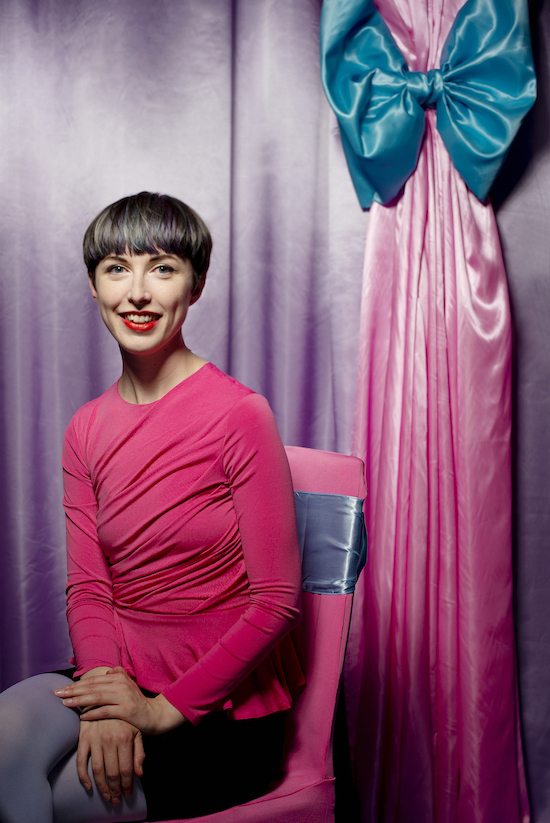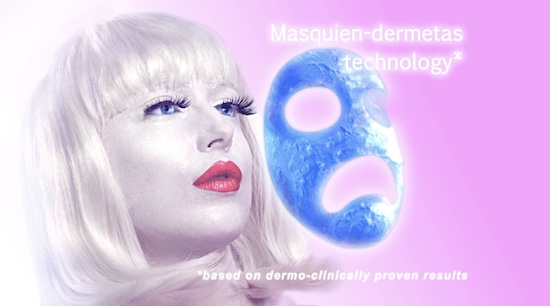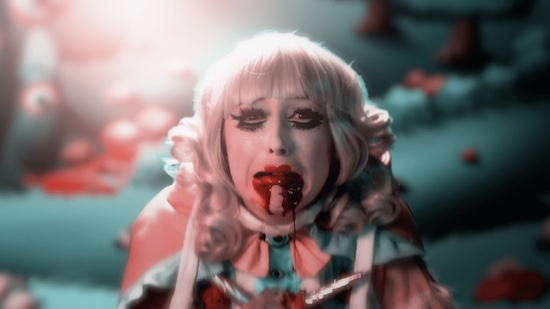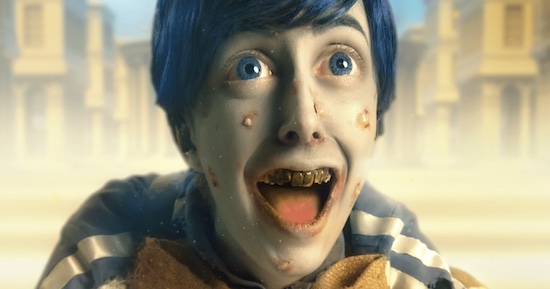The imagery is often violent – tongues get cut out, noses yanked off, human limbs cannibalised. The world of Scottish artist Rachel Maclean is a Grand Guignol horror show, but the horror comes encased in a big, gooey powder-pink meringue. Her films capture something of the heightened aesthetics of My Little Pony, but the appropriation and hybridity of pop-visual cultures is far-ranging, from Disney to video games, pop videos and stage musicals, social media, and even – especially when she dwells on Scottish identity – the 18th and 19th century political satires of Hogarth and Cruickshank. And just as we’re getting hopelessly lost in these pimped-up surreal fantasias, the presence of emojis and hearts pull us into an instantly recognisable online world.
Food and its temptations are a theme, and of course what food stands in for – a ravenous but unquenchable and therefore destructive emotional hunger. For the parade of outlandish characters that appear in her films – films in which she often, though barely recognisably, plays all the characters (Maclean is a natural, highly expressive performer) – needs are never quite satisfied, which naturally means that things rarely end well.
With appetite as one theme, there’s also an abiding concern with female body image, in addition to critiques of advertising and consumer culture. These may be overly familiar areas for artistic critique, but Maclean’s films are imaginative, ambitious, and, moreover, lushly baroque high-end productions, using a green-screen and more props and elaborate costumery than you’d find at a theatrical flea market.
A list of just some of the films spanning a decade of her career since graduating, in 2009, from Edinburgh School of Art include: Please Sir (2014), a very darkly comic adaptation of Twain’s The Prince and the Pauper, in which the dual characters mime audio from the Jeremy Kyle Show, Britain’s Got Talent, and The Apprentice; Make Me Up (2018), commissioned by the BBC and Creative Scotland, in which Maclean’s sinister matriarchal character voices Kenneth Clark’s patriarchal, and often improbably saucy, narration from Civilisation; Eyes 2 Me (2015), a 3-minute short satirising the advertising industry’s infantilisation and sexualisation of girls; Spite Your Face (2017), a dystopian rags to grotesque riches tale starring Pinocchio reimagined as a character called Pic, who becomes increasingly corrupt as he lies his way into high society (it premiered at the 57th Venice Biennale when Maclean represented Scotland); and The Lion and the Unicorn (2012), which satirised the relationship between England and Scotland in the lead-up to the Scottish referendum.
The cartoonish, yet pretty hair-raising violence – or at least its every present threat – is pervasive, though perhaps her most starkly disturbing dystopia is Feed Me (2015), with its themes of child sexual exploitation. It’s no wonder that she continually riffs on the cautionary dark underbelly of fairy tales, though one might also think along the lines of Charlie Brooker’s Black Mirror, with its look at the nightmarish consequences of our addictive relationship to new technologies and online platforms.

We talk over Zoom about her latest commission, for Jupiter Artland. This time, uniquely, it’s an outdoor installation, which opens at the Edinburgh venue in May. Called Upside Mimi, Mimi Down, the work, which will be a permanent installation, comprises a candy-coloured but shabby and decaying shop-fronted building, and has an animated film at its heart. It’s her first sculptural piece, and her first fully animated feature.
“I’d planned originally to shoot a live action film,” she says, “but then decided to switch to animation. I think lockdown has allowed me to experiment with things that I probably wouldn’t have done otherwise. If you can’t get into the studio, and you can’t work with others in person, you have to work around that. There was loads of things I’d wanted to do for a while and I hadn’t done, so having that restriction meant that I could.”
She says that during early-period lockdown last year, she just had a restless need to keep making stuff. “I don’t know if it was a mixture of panic mixed with just a sense of things drifting so quick that I suddenly had loads of ideas.”
The new work is set in an upside down world in which the laws of gravity no longer rule. Animation gave Maclean the freedom to explore that world without technical restriction, though there was the added challenge of translating her own facial expressions into animation, since it’s her own features that have gone into creating Mimi. The character’s name also turns into the plaintive narcissism of “Me, Me”, with a deliberately confusing repetition throughout of both name and pronoun.

However, Maclean doesn’t want to give too much away, since there’s a reveal element to the work that she’s keen not to spoil. But one can at least say there’s a strong theme of duality. And there’s a marriage of two fairy tales: the approach to the candy-coloured shop, which is located in the forested outdoors of Jupiter Artland, is paved with heart emojis, reminding you of Hansel and Gretel, while the Mimi character is inspired by Little Red Riding Hood. The interior walls of the odd-ball shop will be lined with Mimi dolls.
Along with the new work, the exhibition will be showing four films: two shorts, Eyes 2 Me, and the 2013 Germs, the latter also a three-minute film satirising advertising. She says she also chose The Lion and the Unicorn and Spite Your Face, because both are changed by context. She’s happy that Spite Your Face will be shown in Artland’s grand ballroom, while she says that each viewing of the The Lion and the Unicorn is altered by a changing political context.
“Since the SNP landslide [in 2015] all those questions in that film have become politicised in a way they weren’t before and I think there’s this whole question of what you do with all that. Is your vision for the future of Scotland attached to a romantic fantasy or is it purposefully detached from that and more of a forward-looking imaginative space rather than it being drawn from some faux history.” Clearly, in post-Brexit Britain, these questions are as pertinent outside Scotland.

As well as being busy putting the finished touches to Upside Mimi, Mimi Down, Maclean says she is currently writing a feature film, which she hopes will get a cinema release. “It’ll be like a Scottish movie meets a Christmas movie, so like Braveheart meets Elf, if you can imagine that.” She says the idea for it originally came from thinking about Celtic mythology and Scottish fairy tales.
The film, whose working title is Melted, is still at an embryonic stage, though she’s already very keen on making many more films for larger, more mainstream audiences. She acknowledges this brings its own challenges. “I think maybe what I didn’t quite realise when I got into it was, as a video artist you’re expected to break the rules. But in feature filmmaking, if you break too many rules, people don’t even recognise it as a feature film any more. So it’s about navigating that – what rules you stick to and what rules you break.”
Having been commissioned for TV projects in the recent past, including her BBC film Make Me Up, she’s familiar with those constraints.
“As a visual artist there’s creative control. There’s just a different system in television. I think people who’ve worked in it for a long time can just navigate it. I was just not used to getting notes, and not used to having that kind of exchange.”
But she also found that feedback process helpful. And she reveals that some of her most interesting influences have come from TV. She’d love to do more.
“A lot of things that I grew up with were odd things that got on TV and reached a larger audience,” she says. To me they were like almost verging on experimental film or video art.” League of Gentleman, Garth Marenghi’s Darkplace and Mighty Boosh have all been formative, she says. Oh, and Stanley Baxter, the Scottish comic actor, comedian and impressionist ‘of a thousand faces’, whose presence on Saturday night TV was ubiquitous long before Maclean was born.
Upside Mimi, Mimi Down opens at Jupiter Artland, Edinburgh, on 8 May. The exhibition of her films runs from 8 May to 18 July


